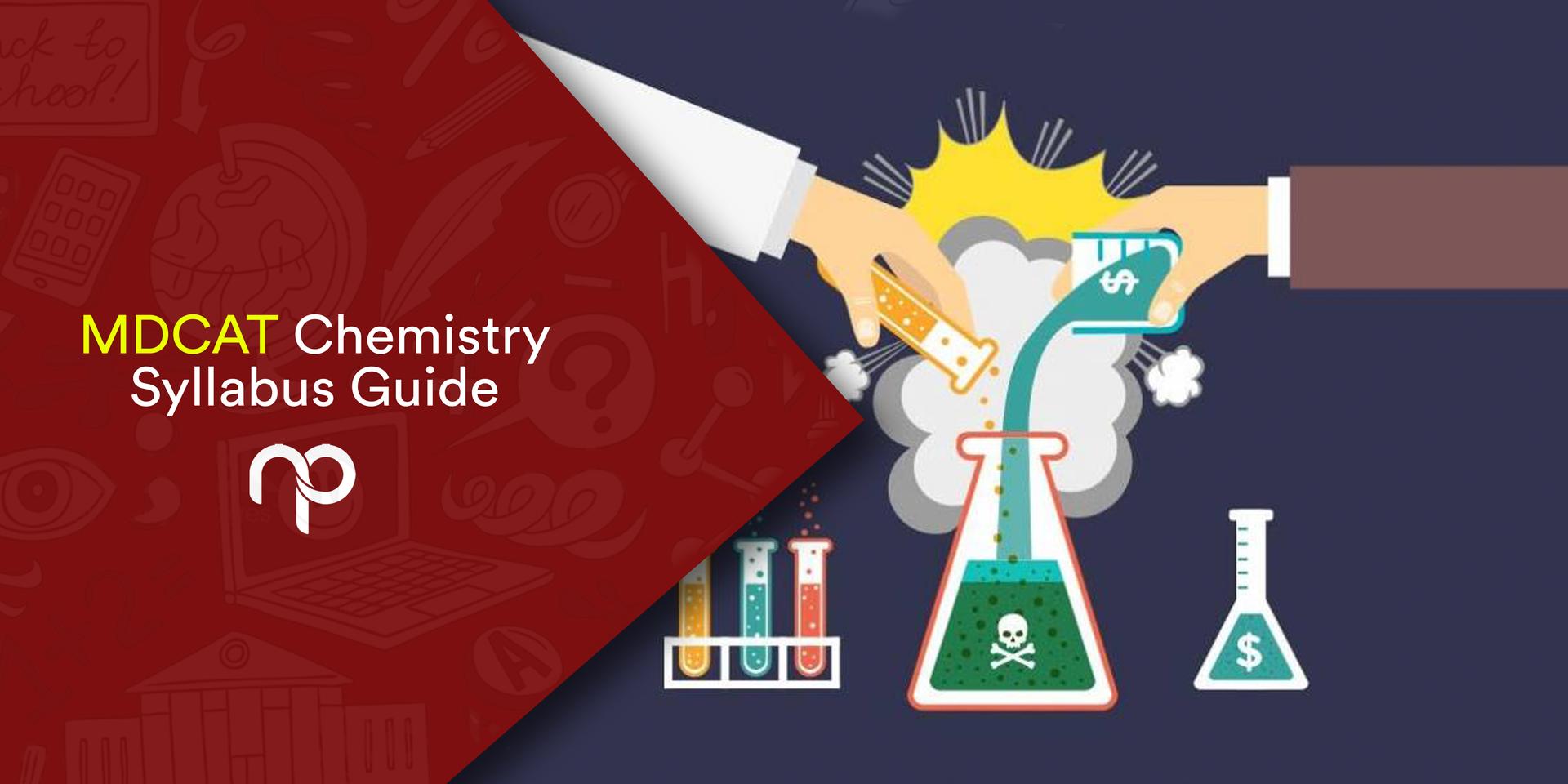
Written By Adil Chattha Sep 23, 2017
Chemistry is the second major portion of MDCAT, which is not just important for MDCAT but afterward, if you get admission in a medical college, you’ll require the knowledge of Chemistry for ‘Biochemistry’ subject. This article explains the syllabus of Chemistry specified by the UHS i.e which chapters from the textbook are included and what specific things you need to focus on while studying your textbook.
Total number of MCQs in Chemistry portion of MDCAT = 58
Total marks = 290
a. Topic distribution according to UHS=
-Physical chemistry:
1. Fundamental concepts = 4 MCQues chapter 1 and 9 FSc part one textbook
2. States of matter = 2 MCQues Chapter 3 and 4 FSc part one textbook
3. Atomic structure = 2 MCQues Chapter 5 FSc part one textbook
4. Chemical Bonding = 2 MCQues Chapter 6 FSc part one textbook

5. Chemical Energetics = 2 MCQues Chapter 7 FSc part one textbook
6. Electrochemistry = 2 MCQues Chapter 10 FSc part one textbook
7. Chemical Equilibrium = 2 MCQues Chapter 8 FSc part one textbook
8. Reaction Kinetics/ Chemical Kinetics = 2 MCQues Chapter 11 FSc part one textbook
-Inorganic chemistry:
1. Periods = 2 MCQues Chapter 1 FSc part two textbook
2. Groups = 2 MCQues Chapter 2-5 FSc part two textbook
3. Transition elements = 2 MCQues Chapter 6 FSc part two textbook
4. Elements of Biological importance = 4 MCQues Chapter 15 FSc part two textbook

-Organic Chemistry:
1. Fundamental principles = 3 MCQues Chapter 5 FSc part two textbook
2. Hydrocarbons = 4 MCQues Chapter 5 FSc part two textbook
3. Alkyl halides = 4 MCQues Chapter 5 FSc part two textbook
4. Alcohols and phenols = 4 MCQues Chapter 5 FSc part two textbook
5. Aldehydes and ketones = 4 MCQues Chapter 5 FSc part two textbook

6. Carboxylic acids = 4 MCQues Chapter 5 FSc part two textbook
7. Amino acids = 2 MCQues Chapter 5 FSc part two textbook
8. Macromolecules = 3 MCQues Chapter 5 FSc part two textbook
9. Environmental chemistry = 2 MCQues Chapter 5 FSc part two textbook
b. Textbook reading:
Textbook reading is extremely important for Chemistry, especially in case of physical and inorganic chemistry. The MCQs given from organic chemistry are mostly reactions based and conceptual. But for topics like Transition elements, Chemical Equilibrium, States of matter, book reading is very important. It is better to give a read to the entire chapter and highlight the important points in the topics that are not included in UHS so you might not need to read them again and again.
c. Exercise Questions:
These are very, very important, especially the numerical based questions. Numerical based questions are very frequently given in physical chemistry portion and textbook exercise questions are very important in this regard. Sometimes, very important points are given in the short questions of exercise so don’t skip them as well. Following are some of the Questions from Past papers of MDCAT, that are given in textbook exercise as well.
Q. The number of moles of CO2 which contain 8.00 grams of Oxygen is: (2016 MDCAT)
A. 0.75
B. 1.50
C. 0.25
D. 1.00
Q. London dispersion forces are the only forces present among the (2016 MDCAT)
A. Molecules of H2O in a liquid state
B. Molecules of HCl gas
C. Atoms of Helium in a gaseous state at high temperature
D. Molecules of solid chlorine
d. Reactions of organic chemistry:

If you have a grip on types of reactions in organic chemistry, then you can easily score maximum marks in this portion of the test. The chapters included in organic chemistry are not very long as compared to the number of MCQs included from those chapters in the test. Some questions from MDCAT past papers are given as follows:
Q. When acid is added to an amino acid, which one of the following will act as a base? (2016 MDCAT)
A. NH3+
B. COO-
C. H+
D. R group
Q. Acetamide is formed by the dehydration of (2014 MDCAT)
A. Oxalic acid
B. Ethanoic acid
C. Butanoic acid
D. Propanoic acid
Q. Methyl cyanides, on boiling with mineral acids or alkalis yield (2013 MDCAT)
A. Acetic acid
B. Formic acid
C. Propanoic acid
D. Butanoic acid
These are the type of questions you can solve easily if you have memorized the reactions and nomenclature of organic chemistry very well. So, start working on organic chemistry from now on. Once you’ve developed a grip on these topics, you won’t need to spend a lot of time on these chapters again and again.
e. Multiple choice questions practice:
Doesn't depend on which MDCAT practice book are you using, the main requirement is you should learn which formula should be used in a specific question and how to apply different concepts and formulas that you have learned in your textbook. You’ll get a lot of knowledge from your textbook, but how to apply that knowledge to solve MCQues is something you can learn through the practice of MCQs.
Nearpeer also offers a free practice book for physics containing hundreds of MCQs.
f. Synopsis of formulas:
Formulas should be on your fingertips because you don't get enough time during the test, to think which formula you should apply. It is better that you have all the formulas relevant to MDCAT Chemistry, written with you on a sheet of paper so you can memorize them easily anytime.

g. Past paper questions:
Following are some free MDCAT Chemistry resources that you can get with Nearpeer without enrolling. A lot of important and conceptual MCQues are given in the quizzes below:
UHS past paper discussion lecture: https://www.nearpeer.org/entry-test-preparation/mdcat/chemistry-(MDCAT-2018)/1/1
Chemistry online quiz:
https://www.nearpeer.org/quiz/162
https://www.nearpeer.org/quiz/422
Click here to Read More MDCAT related Blogs to Learn more about right ways of Studying |
0 Claps